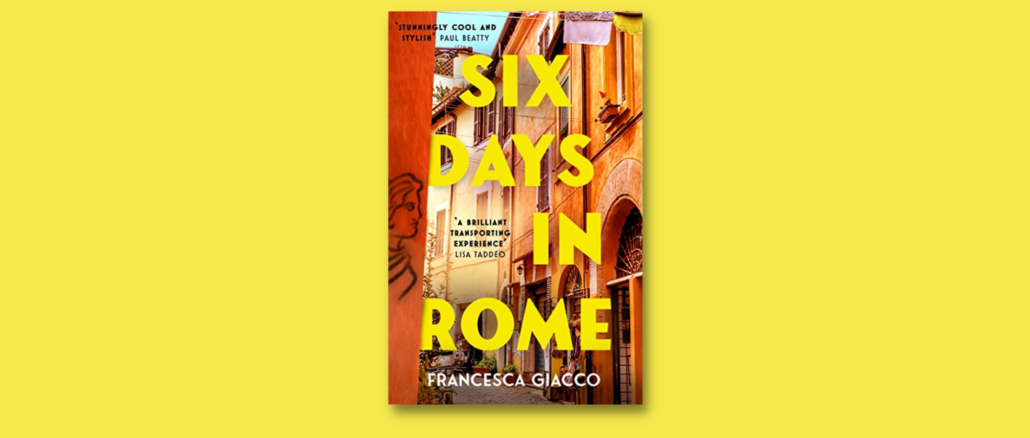
Travel to a foreign locale (specifically in this instance Rome) can lead to imagining and then portraying oneself as a new person, even a better person. Further, romantic entanglements forged in foreign environs are not always as they first seem. That is, are you truly who you habitually are on home soil when immersing yourself in an undeniably rambunctious culture, as is found in Rome, or are you ‘playing the part’ of an unfettered ‘explorer’ and lover of life and others, a part lived by the vast majority of Italians.
Such universal, yet sublimely unique truths, are examined ruminately in stellar American author, Francesca Giacco’s, debut novel, “Six Days In Rome”.
As the soul-enriching, and additionally decadent, title suggests, “Six Days In Rome” is a novel of adventure, joie de vivre and wonder, accompanied by sincere contemplation and reflection.
The novel takes place six days one late July (the northern hemisphere summer, when Rome is bursting with tourists and life), in addition to fragments of events from years past, all related illuminatingly and often poignantly to our protagonist, Emilia. Emilia is a thirty-three year old social media artist from New York, who is staying in Rome for six days on her own. We learn early on that Emilia was meant to be spending her time in the throes of Rome’s beauty and theatre with her ex-boyfriend, Michael. That is, until about thirty-nine days prior to their meticulously planned sojourn, when Michael landed an unerringly traumatic grenade in Emilia’s life by revealing he was actually married.
Emilia is bravely and optimistically attempting to make the most of her holiday (“Today I am alone. I am in a beautiful place”), whilst regularly thinking of Michael, thoughts of him being like unwanted pebbles she is carrying that weigh her down and torment her mentally and emotionally.
Descriptions of Rome in the book are thrilling (in terms of vistas, ancient buildings, churches and statues, colourful Italian characters Emilia encounters on the street, and the cuisine so plentiful and appetising it can lead one to feel more alive).
On one oppressively sunny day, Emilia finds herself tiredly carrying lunch items up Gianicolo Hill in Trastevere. She fortuitously (we hope) meets John, also from New York, not much older than Emilia. John is now ‘living the dream’, living in a studio apartment in a quieter area of Rome. John, a former architect, has been previously associated with the American Academy in Rome (a place where international artists, writers and scholars can reside and work). John now does consulting work when the whim takes him, yet, he tells Emilia, “Maybe I enjoy a life of leisure. Things moving so much slower. Shooting the shit with the old guys. Enjoying a drink in the middle of the afternoon. Not too bad”.
When John asks Emilia to meet him for a drink later, who knows what their tete-a-tete, surrounded by talkative and whimsical Italians and besotted tourists, will develop into? Can John and Emilia bring out the best in eachother, or is their respective inner abrasive pain (John is trying to learn to live again after losing his six-month-old son, Henry, three years ago, and later his marriage) going to cruelly place a wedge between them in the end?
Beneath the ethereal and long-lasting beauty in Rome, as described by Francesca, there is a notably intangible nobility and joyfulness exuded by the city, it’s timeless structures and societal pulls. Almost inevitably, it is a city that millions from around the globe flock to every year, particularly in the sultry summertime.
Emilia, whilst being under the enviable spell of Rome, is nevertheless a trifle envious of John’s take on life. Emilia reflects sadly to herself, “I try to see things as he does, as he must. Content with just existing, not trying to wring the last drop of experience or beauty out of a place. Letting it happen, or not”. Emilia laments to John, “I think I’m so used to having to fight for things, my life feeling like a challenge. I don’t quite trust something when it looks easy”.
Francesca has written an exquisite novel of not only consummate beauty, but skillful intelligence, wisdom and insight into the complex vagaries of human existence.
Bravo Francesca! It was a wonderful thing when your parents took you to Italy for a holiday (as noted in the acknowledgments). It definitively planted a seed in you that grew into a flowering love affair with Italy. I could ‘see’ the magnificence of Rome, as it is described, throughout the book. I loved this book, and can’t wait to see what Francesca writes next.


Leave a Reply